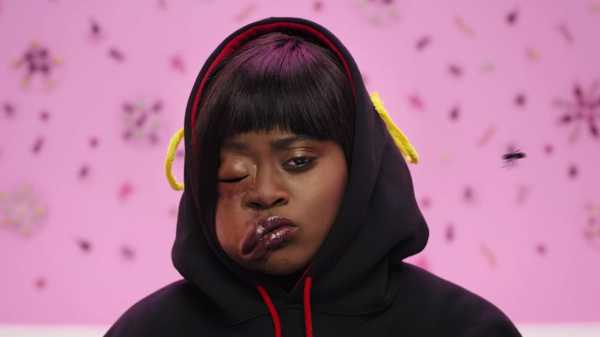
The minute is a strangely flexible unit of time. Waiting for a dreaded event—an interview, a Supreme Court decision—it is as leaden and as detectable as a stone in the palm; when revelling in a welcome one, it takes flight.
The twenty-two-year-old Philadelphia rapper Tierra Whack is interested in the elastic potential of a minute. “Whack World,” her début album, is an exciting and disorienting project of economy, a fierce and imaginative effort to stretch the parameters of her medium by compressing them. For this album, she has given herself a simple but daunting challenge: write fifteen songs, none longer than sixty seconds.
The brevity is bold, but not in and of itself alien. Although album lengths have increased in recent years to meet the exigencies of the streaming age, individual songs are, on average, significantly shorter than they were in the early aughts. (Since 2014, Billboard has classified fifteen hundred streams of a single song as equivalent to an album sale.) Both music statisticians and executives invoke Silicon Valley and its attention-economy gospel, arguing that shorter content caters to distracted minds. This year, Lil Pump’s “Gucci Gang,” at two minutes and four seconds, became the shortest track since 1975 to enter the Billboard Hot 100. But “Gucci Gang” is a cynical earworm, built on interminable repetitions of the title phrase. What distinguishes Whack, who counts Solange Knowles and Flying Lotus among her admirers, is how her concision avoids stasis, and transports us someplace new.
The experimental abruptness of “Whack World” does, at first, produce a bit of whiplash. We are not used to a song falling off on an up-note, to the chorus not completing its third round, to the lack of a fadeout. “Fuck Off,” for example, teases a concept that I wish I could hear come to fruition. It is a bizarre take on a country revenge song, with Whack summoning a shrill twang as she muses that an ex reminds her of her deadbeat dad. She then falls headlong into an energetic verse—“Ice cold, in a coat, baby, I won’t thaw”—but it cuts off before she can carry out her threat. The minute-long time frame runs the risk of seeming arbitrary, or shallow.
But artists who give themselves limits do so for a reason. On “Whack World,” form fits subject; Whack uses her brief songs to riff on those swooning states that young women enter intensely and fleetingly—infatuation, frustration, mania, grief, that sudden and intoxicating burst of self-confidence that mercilessly dissipates into self-loathing. The songs are rapid mise en scènes, with Whack as mordant narrator, as if she’d been plucked from a rambunctious but meditative teen movie. “Hungry Hippo,” a track about sexual awakening, is named after the children’s game. “Cable Guy” gets exactly the quiet deflation of flirtation left unreciprocated, and includes some of my favorite interaction between lyrics and ad-libs since the advent of Migos. (On the heels of the phrase “ABC,” she deadpans, “All boys cry”; after “BET,” “Bitches eat tacos.”) After a minute, each feeling, like each song, has been replaced by another.
As a child, Whack was a timid poet; she wrote her stanzas down in the private space of notebooks. In her adolescence, she started converting her poems into verses. Freestyling over Meek Mill’s “In My Bag,” a teen-aged Whack, then performing under the moniker Dizzle Dizz, courted comparison to several sportive, dazzling street rappers, those capable of free-associating for minutes at a time. Since then, she has gone, as she put it in an interview last year, “from being a rapper to an artist.” In 2017, she released a video for the song “Mumbo Jumbo,” in which sterile dentists drill into her mouth. The lyrics are basically unintelligible but the melody is lush (Whack is a trained singer); the considered nonsense recalls Ishmael Reed’s novel of the same name, his imagined, vibrant plague of black creativity run amok. In a recent interview with Pitchfork, she spoke of her day job, as a doorwoman at a condominium in Philadelphia: “I just look at it as symbolism: Right now, I just dropped a crazy project, and I’m opening doors. I’m breaking the door down.”
To accompany her aural experiment, Whack has made a physical “Whack World,” too, pairing each of the album’s tracks with videos that she débuted on Instagram. Whack is an enthusiastic pupil of the louche, fish-eyed perspectives of Busta Rhymes and Missy Elliott, as captured in the music videos of the director Hype Williams, and also, as she told the Times earlier this month, the bedlam of Tarantino films. “It’s down, then up, down, then up. It’s scary, it feels good, it doesn’t. It’s crazy, it’s calm. It’s everything,” she said, when asked to describe the project. But her videos, directed by Thibaut Duverneix and Mathieu Léger, have a specific grammar, which I find particularly refreshing in this moment of vague black-futurist potpourri. The environments she imagines—a baby-pink salon for “Black Nails,” where she wears a freakish mask; a veterinarian’s office in “Flea Market,” where she works on the coat of an inanimate canine—are soulfully deranged, housing associative metaphors for despair. In “Dr. Seuss,” Whack is a giantess in a small house, like Alice in her cruel and unpredictable “Wonderland.” (“I like creepy shit,” she has said.) Whack has a severe allergy to insects, which she mines for a pointed pun about fame; in the video for “Bug’s Life,” half of her face is swollen in anaphylactic shock, and she muses, “Probably would have blew up overnight if I was white.”
These vignettes are engineered for Instagram, which at present only supports videos that are sixty seconds long. (The company has also released a stand-alone application, IGTV, which will support sixty-minute videos. Get ready for an Instagram film studio). But Whack’s is the sort of exercise that makes us feel curious, not cheated; her canny adaptation to the constraints of social media is not without knowingness or built-in critique. “Whack World” is, in part, a sincere consideration of the ambient pressure that women feel to modify their bodies to fit into its claustrophobic ideals. In the video for “Pretty Ugly,” Whack magnifies her features absurdly; for “Fruit Salad,” a song about self-care, she pedals comically on a neon-green stationary bicycle. She knows that Instagram is a shiny, sadistic fun house, a space that can puncture self-esteem in the space of a minute. If only for a few, she seems interested in hacking its tyrannical gaze.
Sourse: newyorker.com






